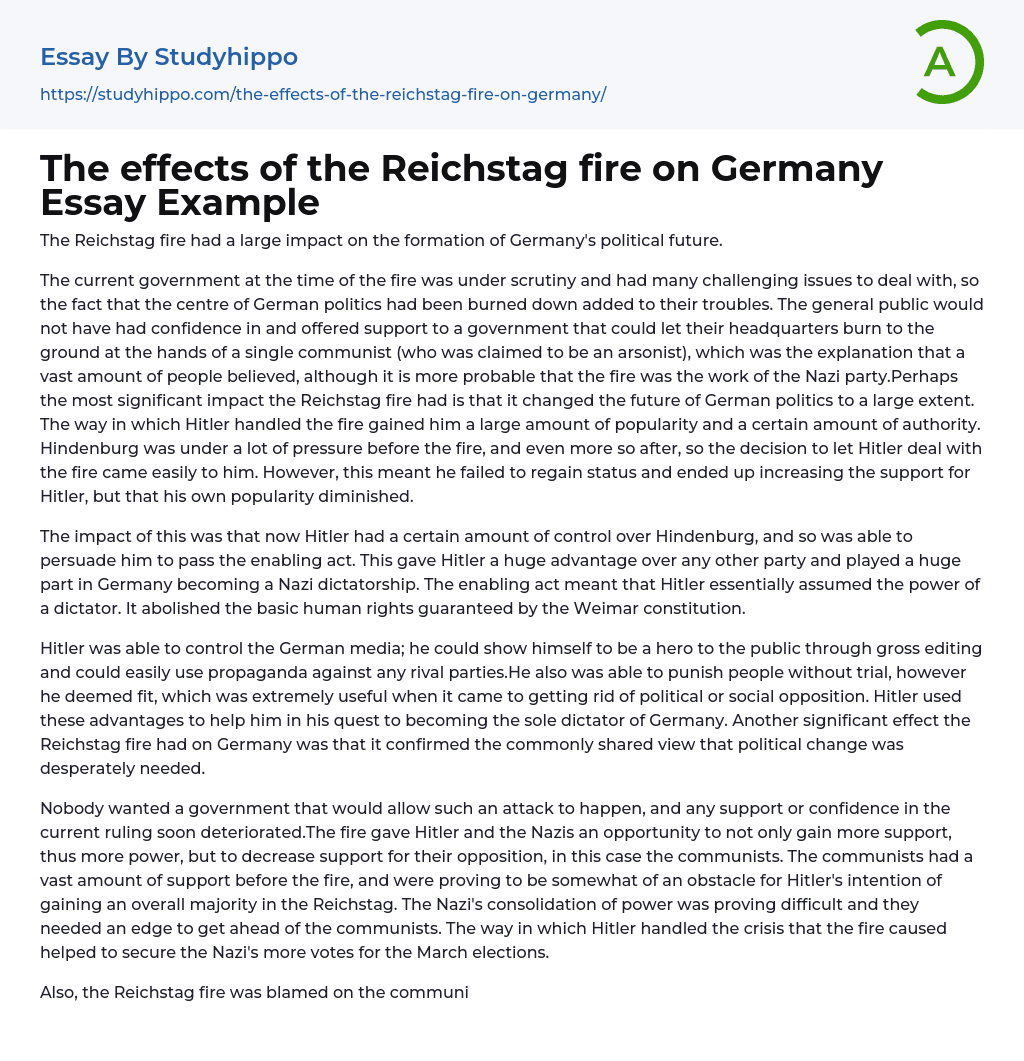

The effects of the Reichstag fire on Germany Essay Example
The Reichstag fire had a large impact on the formation of Germany's political future.
The current government at the time of the fire was under scrutiny and had many challenging issues to deal with, so the fact that the centre of German politics had been burned down added to their troubles. The general public would not have had confidence in and offered support to a government that could let their headquarters burn to the ground at the hands of a single communist (who was claimed to be an arsonist), which was the explanation that a vast amount of people believed, although it is more probable that the fire was the work of the Nazi party.Perhaps the most significant impact the Reichstag fire had is that it changed the future of German politics to a large extent. The
...way in which Hitler handled the fire gained him a large amount of popularity and a certain amount of authority. Hindenburg was under a lot of pressure before the fire, and even more so after, so the decision to let Hitler deal with the fire came easily to him. However, this meant he failed to regain status and ended up increasing the support for Hitler, but that his own popularity diminished.
The impact of this was that now Hitler had a certain amount of control over Hindenburg, and so was able to persuade him to pass the enabling act. This gave Hitler a huge advantage over any other party and played a huge part in Germany becoming a Nazi dictatorship. The enabling act meant that Hitler essentially assumed the power of a dictator. It abolished the basic human rights
guaranteed by the Weimar constitution.
Hitler was able to control the German media; he could show himself to be a hero to the public through gross editing and could easily use propaganda against any rival parties.He also was able to punish people without trial, however he deemed fit, which was extremely useful when it came to getting rid of political or social opposition. Hitler used these advantages to help him in his quest to becoming the sole dictator of Germany. Another significant effect the Reichstag fire had on Germany was that it confirmed the commonly shared view that political change was desperately needed.
Nobody wanted a government that would allow such an attack to happen, and any support or confidence in the current ruling soon deteriorated.The fire gave Hitler and the Nazis an opportunity to not only gain more support, thus more power, but to decrease support for their opposition, in this case the communists. The communists had a vast amount of support before the fire, and were proving to be somewhat of an obstacle for Hitler's intention of gaining an overall majority in the Reichstag. The Nazi's consolidation of power was proving difficult and they needed an edge to get ahead of the communists. The way in which Hitler handled the crisis that the fire caused helped to secure the Nazi's more votes for the March elections.
Also, the Reichstag fire was blamed on the communist party, who were at the time proving to be a real threat to the consolidation of the Nazis power. By blaming the communists, and having control of the national services for a certain period of time after the fire,
Hitler was able to eliminate a lot of important political opposition, arresting over 100 communists on the night of the fire. This also increased the public opinion that the communists were violent extremists and that they were not to be trusted in power, which once again benefited Hitler as it caused a major blow to his only potential opposition.The Reichstag fire also caused a lot of decrees to be passed which would have a significant effect on Germany. Decrees such as the reduction of salaries to officials of private concerns who make higher salaries than civil servants, had a large impact on the social aspects of Germany, but was mainly passed to either increase the Nazi's (civil servants) pay wage, or decrease that of the officials of private concerns (socialist, Jews). There were a number of petty laws passed just to benefit the Nazis, and only passed to prove a sense of authority.
Other less significant effects of the fire include the execution of Marinus Van der Lubbe for high treason, and the passing of a law which favoured hanging over life imprisonment for arson. Overall, the Reichstag fire had a huge effect on Germany and essentially gave Hitler his opportunity to seize power. The enabling act allowed Hitler to boost his reputation and the fact that he was able to have control other the authorities on the night of the power meant he could blame, and cause damage to his opposition, thus leading the Nazis to an overall majority in the Reichstag, which in turn led to a Nazi dictatorship in Germany.
- Adolf Hitler essays
- Concentration Camps essays
- Elie Wiesel essays
- Holocaust essays
- Nazi Party essays
- Weimar Republic essays
- Adaptation essays
- Adventure essays
- Adversity essays
- Aging essays
- Alcohol essays
- Barbie Doll essays
- Beauty essays
- Care essays
- Carpe diem essays
- Change essays
- Chess essays
- Chicken essays
- Choices essays
- Contrast essays
- Crops essays
- Development essays
- Dream essays
- Evil essays
- Experience essays
- Family essays
- Farm essays
- Fire essays
- First Love essays
- Focus essays
- Greed essays
- Hero essays
- Holiday essays
- House essays
- Housing essays
- Humility essays
- Humor essays
- Hypocrisy essays
- Integrity essays
- Law of Life essays
- Life Changing Experience essays
- Life Experience essays
- Lifestyle essays
- Limitations essays
- Love Story essays
- Mother Tongue essays
- Motherhood essays
- My Neighborhood essays
- Myself essays
- Mystery essays



